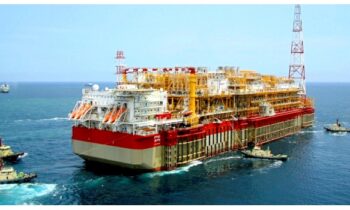The Nigerian National Petroleum Company Limited (NNPCL) and TotalEnergies have announced the successful commencement of oil production from the Akpo West Field located 135 kilometres off the coast on Petroleum Mining Licence (PML) 2.
This is part of efforts to ramp up the nation’s oil production needed to boost oil reserves and foreign exchange earnings.
Join our WhatsApp ChannelREAD ALSO: Fuel Scarcity: NNPCL Explains Lagos Fuel Queues As “Brief Distribution Issue”
According to a statement signed by the NNPCL spokesperson Femi Soneye, the milestone achievement, “which is the result of meticulous planning, strategic collaboration, and unwavering dedication from all stakeholders involved in the project, will add 14,000 barrels per day condensate to the nation’s production.”
The statement added that there is plan to subsequently produce about 4 million cubic meters of gas per day by 2028.
The development of Akpo West which is on Petroleum Mining Lease (PML) 2 (formerly OML 130) leverages the existing Akpo Floating Production Storage and Offloading (FPSO) facility via a subsea tie-back to keep costs low and minimises greenhouse gas emissions.
“The milestone was enabled by the strategic leadership of the Group Chief Executive Officer (GCEO), Mr. Mele Kyari, and the Upstream Directorate of the NNPC Ltd. whose support played no small role in propelling the operators to actualise the short- and mid-term hydrocarbon production goals of the President Tinubu administration.
“Located 135 kilometres offshore, Akpo West is one of the discoveries on PML 2 with proximity to the Akpo Main, which started up in 2009 and produced 124,000 barrels of oil equivalent per day in 2023.”
PML 2 is operated by TotalEnergies with a 24% interest, in partnership with CNOOC (45%), Sapetro (15%), Prime 130 (16%), and the Nigerian National Petroleum Company Ltd. as the concessionaire of the Production Sharing Contract (PSC).
In its statement announcing the commencement of Akpo West oil production, TotalEnergies said the hydrocarbon project is committed to the global goal of reducing greenhouse gases which contributes to global warming.
Senior vice president of TotalEnergies’ Africa, exploration, and production, Mike Sangster, emphasized how the Akpo West project is strategically aligned with the company’s focus on low-cost, low-emission projects.
“After Ikike in 2022, TotalEnergies is pleased to start production of another tie-back project in Nigeria, Akpo West, which will contribute to maintaining the production of the existing Akpo facilities by developing additional nearby resources,” the French energy giant said.
“The Akpo West development leverages the existing Akpo facilities to keep costs low and minimise greenhouse gas emissions. The project’s carbon intensity is expected to be below 5 kg CO2e/boe and will contribute to reduce the average carbon intensity of TotalEnergies’ portfolio.
“This project leverages TotalEnergies’ solid footprint in Nigeria and will quickly bring value to the country, TotalEnergies and its partners,” added.
Victor Ezeja is a passionate journalist with six years of experience writing on economy, politics and energy. He holds a Masters degree in Mass Communication.



















Follow Us